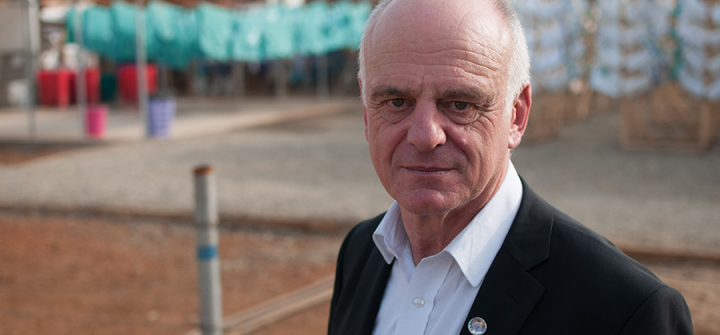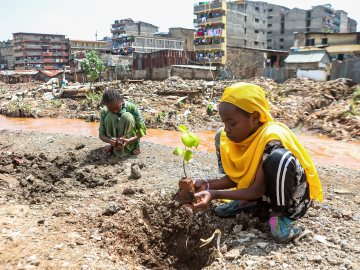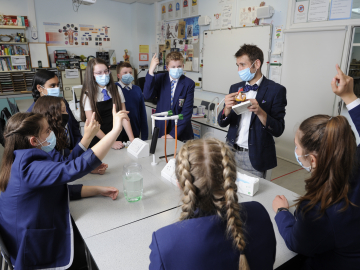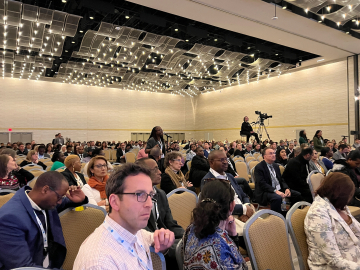Top Priorities and Budget Fixes: David Nabarro’s Q&A, Part III
Transform WHO’s outbreak and emergency response. Improve member states’ response to noncommunicable diseases. Increase health care access for the most vulnerable. WHO DG candidate David Nabarro has a crisp, well-honed response when asked what his top priorities would be if he were to take charge of the WHO.
In this 3rd installment of Nabarro’s GHN Q&A, he also explains his plans to bolster WHO’s $2 billion budget. Assessed contributions paid by member states only cover 30% of this budget, which is set by the World Health Assembly. The remainder, at least in theory, is covered by voluntary contributions earmarked for specific initiatives. Read on for Nabarro’s thoughts on putting WHO on more sound financial footing. “The key, I believe, is to demonstrate value for money in everything the WHO does,” he says.
What would be your 3 greatest priorities as DG?
I will use my expertise and experience to transform how WHO responds to disease outbreaks and health emergencies. I know what is required after leading international responses to malaria, avian influenza, and Ebola. In the event of a disease outbreak or a humanitarian emergency, WHO is expected to show the way, guiding and coordinating others as they respond. This is WHO’s contribution to the safety of people everywhere in our world: We all depend on WHO being able to assist governments as they face threats of disease. My priority will be to ensure that WHO does this and helps ensure that everyone knows what they should be doing to maintain public safety whatever diseases may appear.
I want WHO to bring about reductions in widespread suffering caused by NCDs such as cancer cardiovascular disease and diabetes. I will help member states dealing with these lifestyle illnesses with early intervention and prevention—changes that can be achieved at low cost but call for a concerted effort by multiple actors across society. The WHO will set the standards and encourage successful implementation by working through governments, NGOs and other actors. I want the WHO to help these different partners to demonstrate results and show that it offers value for money. I want the WHO to be trusted by people, governments and partners everywhere—contributing to improved standards of health and health care.
I will strive to ensure that the most vulnerable are not left behind and that women and children get access to the health services they need.
I like getting things done. My focus is on tangible outcomes. And for me, the most important outcome of the WHO’s work is enabling all people everywhere to attain the highest possible standard of health, in an inclusive way that leaves no one behind.
What would you do to improve WHO’s funding situation to secure the WHO budget?
The budget of WHO is set by the World Health Assembly and currently stands at around US$ 2 billion per year. The funds are needed to enable the organization to perform the program of work that the Assembly has approved. The funds are mobilized from the subscriptions paid by WHO members (the “assessed contributions”) and voluntary contributions which are provided for specific activities by donors (development agencies, foundations and individuals). At present funds from the assessed contributions cover about 30% of the total budget request. There is a shortfall because the voluntary contributions are not sufficient to make up the difference.
The Member States are debating whether to increase the funds from assessed contributions. Not all agree that an increase is warranted: those that favor an increase do not agree on the level of increase (some seek a 10% increase, others are proposing smaller figures). Efforts are also being made to increase the funds mobilized by WHO through voluntary contributions – with a preference for funds that are not tightly earmarked for specific activities.
WHO has sought to (a) demonstrate that existing funds are being used to deliver expected results with maximum efficiency and zero waste, and (b) to increase the number of donors who contribute voluntary funds. I will increase the effort to demonstrate efficiency, linking investments made to impact achieved. I will also work with donors to establish precisely what they require if making voluntary contributions. By increasing the value that contributors obtain from their investments, I will make the case for increased contributions so that the income of the organization from assessed contributions is closer to the budget as set by the Health Assembly. I will also encourage voluntary contributions that are earmarked for health outcomes rather than for specific activities.
The key, I believe, is to demonstrate value for money in everything the WHO does. This will enable the stabilization of income and will strengthen the WHO’s financial position.
Many other multilateral organizations are also facing the exact same difficulties—so I will consult widely to understand the approaches they use. I am not daunted or troubled about the challenge of resource mobilization: I have tackled complex challenges throughout my career, and I have a record of delivery. I have raised funds for responding to many different issues and am confident I can continue to be successful.
This interview has been edited for clarity and length.
Read other installments of Global Health NOW’s 4-part Q&A with David Nabarro here.
See the recent GHN Q&A series with DG candidate Sania Nishtar here.
Join the thousands of subscribers who rely on Global Health NOW summaries and exclusive articles for the latest public health news. Sign up for our free weekday enewsletter, and please share the link with friends and colleagues: Subscribe to GHN
Dr. David Nabarro, Special Envoy on Ebola, in an Ebola treatment unit (ETU) run by GOAL Global in Port Loko, Sierra Leone, January 2015. UNMEER/Simon Ruf





